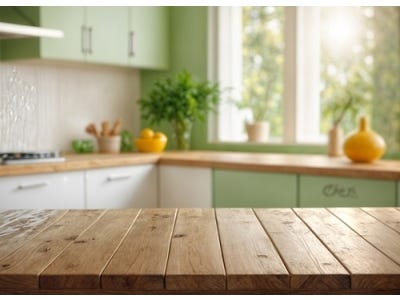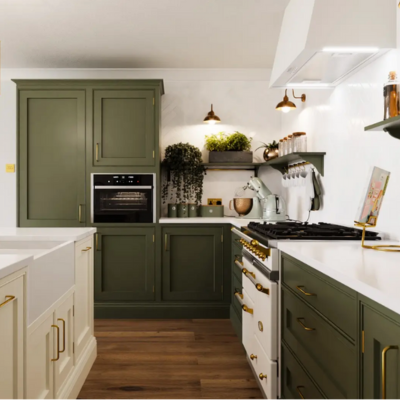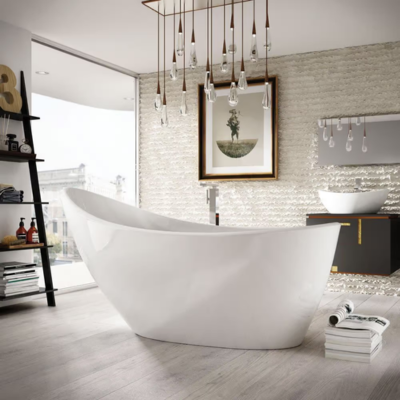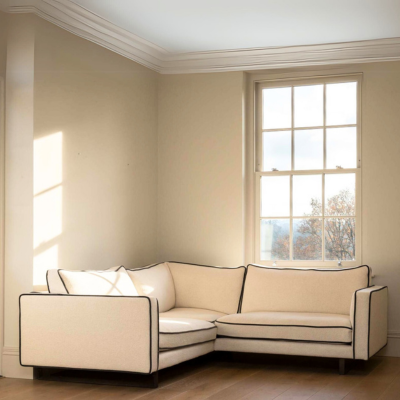There are multiple elements to a whole kitchen renovation, and choosing kitchen countertop materials is just one of them.
But with so many different options on the market, which one is best? Choosing the right kitchen countertop material is a matter of personal preference. It involves balancing durability, maintenance, cost, and style. From classic granite and marble to modern quartz and stainless steel, each worktop material has unique advantages and drawbacks.
Here, we look at the pros and cons of popular kitchen countertop materials to help you make an informed choice about your next kitchen renovation.
Granite
Granite is a popular choice due to its natural beauty and durability. Each slab is unique, giving your kitchen a one-of-a-kind look.
Pros of Granite:
- Durable and scratch-resistant: Granite is strong and durable, and its resistance to scratches and heat makes it a great choice.
- Natural beauty: Thanks to natural veining, unique patterns, and an array of colours, a granite worktop will add a luxury touch to any kitchen.
Cons of Granite:
- Maintenance required: As granite is porous, you’ll need to seal it regularly to help stop the surface from stains.
- Expensive: It’s definitely one of the more expensive materials for your kitchen worktop, and you’ll also need professional installation.
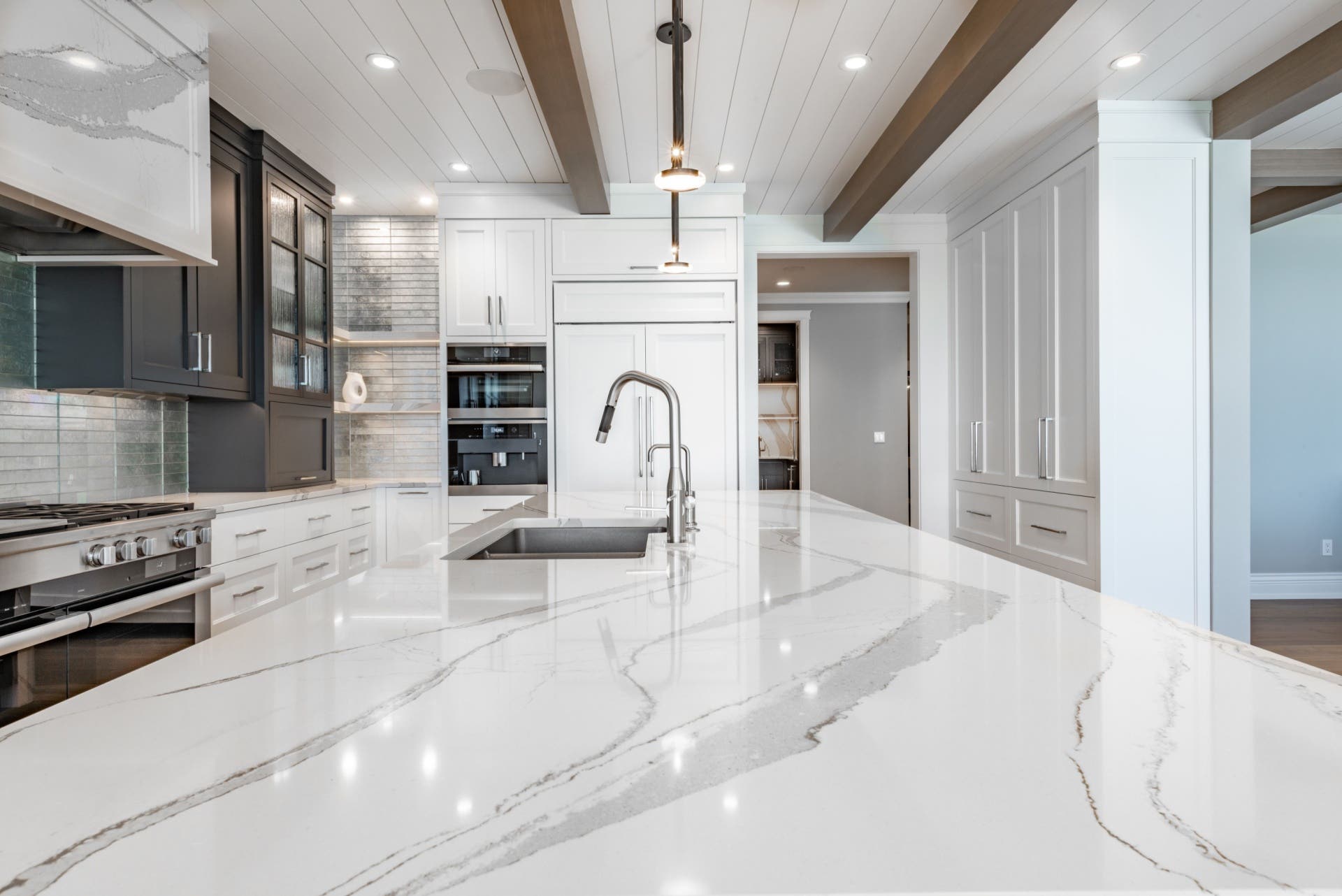

Marble
Marble is an elegant worktop material that will instantly elevate any kitchen. Known for its distinctive veining, marble is available in a broad range of colours and striking colour combinations, such as white marble with grey or black veining, and black marble will likely have striking white or gold veining.
Pros of Marble:
- Timeless appeal.
- Luxurious appearance: Marble is sophisticated, elevating any kitchen design.
- Unique: No two pieces of marble are the same.
Cons of Marble:
- Soft stone: Marble is a softer stone than some, which means it can be scratched, etched, or stained.
- High maintenance: You’ll need to regularly seal the stone to help protect it.
Quartz
Quartz countertops are engineered to create their natural look, made from compressing natural quartz and resin together. The result is a durable and versatile kitchen worktop option that requires minimal maintenance.
Pros of Quartz:
- Non-porous: Unlike natural stone, quartz doesn’t need to be sealed.
- Resistant to stains and bacteria.
- Wide variety: Quartz is available in a huge array of colours and patterns, including those that look like natural stone.
Cons of Quartz:
- Expensive: Slightly cheaper than natural stone countertop options, but quartz still sits at the higher end of the price range for worktops.
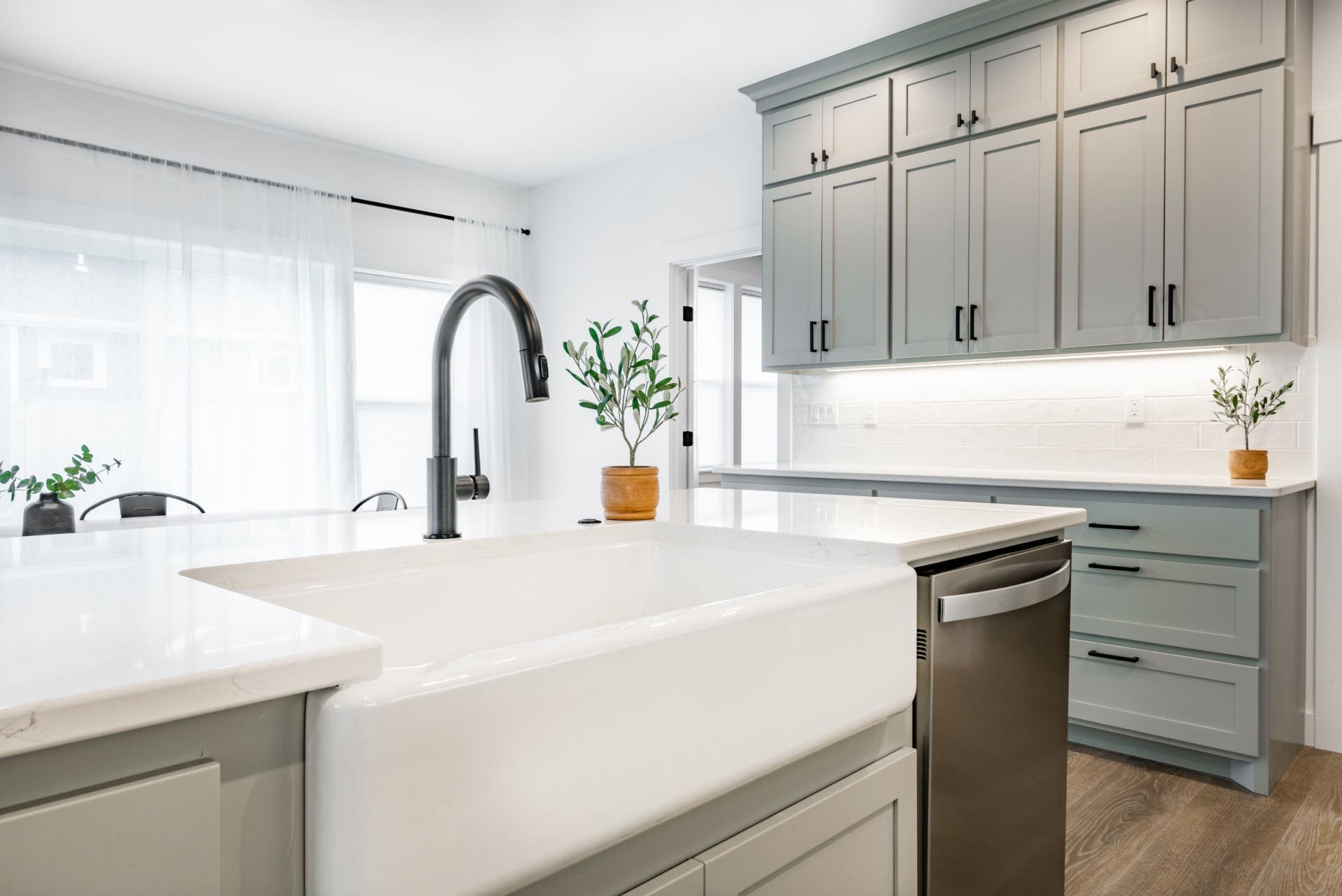

Laminate
Laminate countertops have a reputation for being cheap and dated, but they’ve improved greatly over the years. They are a budget-friendly solution, but their quality is much improved, and the range of designs available is quite staggering.
Pros of Laminate:
- Budget-Friendly: One of the most cost-effective options available.
- Easy to Clean and Maintain: Non-porous and easy to wipe down, making it a low-maintenance choice.
Cons of Laminate:
- Prone to Scratches and Burns: Laminate is not heat-resistant and can easily scratch, dent, or burn.
- Can Appear Less Luxurious: While modern designs are available, they lack the depth and richness of natural materials.
Corian
Corian worktops are solid-surface countertops made from a blend of acrylic polymer and natural minerals. Their seamless appearance and versatility make them a modern kitchen worktop solution.
Pros of Corian Worktops:
- Seamless Joints: Smooth, continuous surface with no visible seams.
- Non-porous: Resistant to stains, mould, and bacteria, easy to clean.
- Durable: Scratch-resistant and repairable if damaged.
- Customisable: Can be shaped and coloured to suit various designs.
- Low Maintenance: Requires minimal upkeep compared to natural stone.
Cons of Corian Worktops:
- Heat Sensitivity: Prone to heat damage; requires trivets for hot items.
- Scratches Easily: Though repairable, it can show scratches with heavy use.
- Price: More expensive than laminate, though cheaper than high-end stone.
- Not as Hard as Stone: Less resistant to dents compared to granite or quartz.
Wood / Butcher Block
Wood or butcher block countertops are a beautiful focal point in any kitchen design, and they give your home a warm, rustic charm that's hard to replicate.
Pros of Wood Worktops:
- Aesthetic Appeal: Adds warmth and natural beauty to any kitchen.
- Renewable: Can be sanded and refinished to remove scratches and stains.
- Eco-friendly: Made from sustainable materials if sourced responsibly.
Cons of Wood Worktops:
- Requires Regular Maintenance: Needs sealing and oiling to prevent drying or warping.
- Susceptible to Water Damage: Prone to staining, swelling, or cracking if exposed to moisture.
- Scratches and Dents: Easily damaged by knives and heavy use.
- Bacterial Concerns: Needs proper care to avoid bacteria from food absorption.
Concrete
Concrete worktops are made from a blend of cement, aggregates, and pigments, resulting in a customisable look that’s unique to your home. This modern, industrial look works well for those who want to choose from a range of colours, textures, and finishes.
Pros of Concrete Worktops:
- Customisable: Can be shaped, coloured, and textured to fit any design.
- Durable: Strong and long-lasting when properly sealed.
- Heat-Resistant: Can withstand hot pots and pans without damage.
- Unique Aesthetic: Offers a modern, industrial look that ages with character.
- Versatile: Supports embedded elements like stones, glass, or metal.
Cons of Concrete Worktops:
- Requires Sealing: Needs regular sealing to prevent stains and water damage.
- Cracking Risk: Prone to hairline cracks over time.
- Heavy: Requires reinforced cabinetry to support its weight.
- Costly: Customisation can drive up the price.
- Maintenance: Needs regular care to avoid stains and preserve finish.


Stainless Steel
Stainless steel is a go-to choice for professional kitchens due to its durability and ease of cleaning. It's also a great choice for homes with a contemporary vibe.
Pros of Stainless Steel:
- Highly Durable and Heat-Resistant: Resistant to heat, stains, and bacteria.
- Hygienic and Easy to Clean: Non-porous and can be easily cleaned with a simple wipe-down.
Cons of Stainless Steel:
- Can Dent or Scratch: While durable, it can show dents, scratches, and fingerprints.
Porcelain
Porcelain countertops are another excellent choice for kitchen worktop surfaces. They are impressively durable and available in a wide range of designs.
Pros of Porcelain:
- Extremely Durable and Resistant to Heat: Harder than granite and non-porous, making it highly resistant to scratches, heat, and stains.
- Low Maintenance: Requires very little maintenance beyond regular cleaning.
Cons of Porcelain:
- Can Be Costly: High-quality porcelain can be more expensive than some natural stones.
- Limited Edge Styles: Due to its brittleness, there are fewer edge styles available.


Limestone
Limestone gives a soft, natural look that brings warmth and character to any kitchen.
Pros of Limestone:
- Soft, Natural Appearance: Adds a subtle and elegant charm to your kitchen.
- Heat-Resistant: Can handle hot pots and pans without damage.
Cons of Limestone:
- Prone to Scratches and Stains: It is softer and more porous than other stones, making it susceptible to damage.
- Requires Regular Sealing: Needs frequent sealing to maintain its appearance and durability.
Soapstone
Soapstone is a unique, non-porous material that provides a smooth, matte finish. It is suitable for both modern and traditional kitchen designs.
Pros of Soapstone:
- Non-Porous and Resistant to Stains: Unlike other stones, it doesn’t require sealing and is resistant to most stains.
- Gives a unique aesthetic that darkens with age, adding character.
Cons of Soapstone:
- Can Scratch and Chip Easily: Soapstone is softer than granite or quartz, making it prone to scratches and chips.
- There are limited colour options with soapstone worktops.
Unfortunately, when it comes to choosing a kitchen countertop, there’s not one material that’s truly perfect without any downsides. Each worktop has its benefits and drawbacks, and you have to make a choice based on your style, budget, and the material's practicality for your home. Hopefully, we’ve provided you with the knowledge to make an informed choice about the kitchen countertop material to install in your home.
